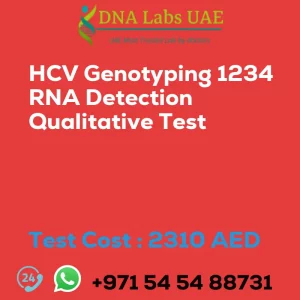RSV A RSV B Viral Load Quantitative Test
At DNA Labs UAE, we offer the RSV A RSV B Viral Load Quantitative Test to measure the amount of respiratory syncytial virus (RSV) present in a patient’s respiratory secretions.
Test Details
The RSV A RSV B Viral Load Quantitative Test is a laboratory test used to measure the amount of RSV present in a patient’s respiratory secretions. RSV is a common virus that causes respiratory tract infections, especially in young children and older adults.
The test involves collecting a sample of respiratory secretions, such as nasal swabs or bronchoalveolar lavage fluid, from the patient. The sample is then analyzed in the laboratory using molecular techniques, such as polymerase chain reaction (PCR), to detect and quantify the amount of RSV genetic material present.
The results of the test provide information about the viral load, or the amount of RSV present in the sample. This information can help healthcare providers assess the severity of the infection, monitor the effectiveness of treatment, and determine the risk of transmission to others.
The RSV A RSV B Viral Load Quantitative Test is particularly useful in diagnosing and managing RSV infections in high-risk individuals, such as premature infants, elderly individuals, and those with compromised immune systems. It can also be used to track the progression of the infection over time and guide decisions regarding isolation precautions and treatment options.
Test Components and Price
The RSV A RSV B Viral Load Quantitative Test costs AED 2310.0. The test requires samples of bronchial swab, bronchial lavage, sputum, nasopharyngeal (NP) aspirates and swabs in viral transport medium, or lung tissues.
Report Delivery
The test report will be delivered via email within 48 hours and on phone within 36 hours. The complete report will be available on the 4th working day.
Method and Test Type
The RSV A RSV B Viral Load Quantitative Test is performed using the Real Time PCR method. It is classified as a viral test.
Pre Test Information
Prior to the test, patients are required to sign a consent document and bring any clinical history related to RSV A and RSV B infections.
Doctor and Test Department
The test is conducted under the supervision of a physician and falls under the Genetics department.
At DNA Labs UAE, we provide accurate and reliable testing services for RSV A and RSV B viral load. Our state-of-the-art laboratory and experienced team ensure quick and efficient testing processes.
| Test Name | RSV A RSV B Viral Load Quantitative Test |
|---|---|
| Components | |
| Price | 2310.0 AED |
| Sample Condition | Bronchial Swab, Bronchial Lavage, Sputum, Nasopharyngeal (NP) aspirates and swabs in viral transport medium, or lung tissues, ETC. |
| Report Delivery | 4th Working Day Email : 48 hours.On phone : 36 hours |
| Method | Real Time PCR |
| Test type | Viral |
| Doctor | Physician |
| Test Department: | Genetics |
| Pre Test Information | Need to sign Consent document and bring any clinical history of patient forRSV A, RSV B Viral Load QuantitativeTest |
| Test Details |
The RSV A, RSV B Viral Load Quantitative Test is a laboratory test used to measure the amount of respiratory syncytial virus (RSV) present in a patient’s respiratory secretions. RSV is a common virus that causes respiratory tract infections, especially in young children and older adults. The test involves collecting a sample of respiratory secretions, such as nasal swabs or bronchoalveolar lavage fluid, from the patient. The sample is then analyzed in the laboratory using molecular techniques, such as polymerase chain reaction (PCR), to detect and quantify the amount of RSV genetic material present. The results of the test provide information about the viral load, or the amount of RSV present in the sample. This information can help healthcare providers assess the severity of the infection, monitor the effectiveness of treatment, and determine the risk of transmission to others. The RSV A, RSV B Viral Load Quantitative Test is particularly useful in diagnosing and managing RSV infections in high-risk individuals, such as premature infants, elderly individuals, and those with compromised immune systems. It can also be used to track the progression of the infection over time and guide decisions regarding isolation precautions and treatment options. |








